April 2016
|
| |
Rejoice in the Lord
Philippians 4:4 tells us to rejoice in the Lord always.
Basking in the brilliance of Holy Week and Easter, we
certainly have a lot to be thankful for and to rejoice
in, as Luther noted – our “freedom from sin, death,
God’s wrath, the devil, hell, and eternal damnation” (Luther’s
Works
23:404). He elaborates further on this verse in a 1522
sermon:
|
Saint Paul is here speaking about…. a
completely heartfelt delight toward God…. There
is no sin there, no fear of death or hell, but
rather a glad and all-powerful confidence in God
and His kindness. For that reason he calls it a
joy in the Lord, not in silver or gold, not in
eating or drinking, not in pleasure or singing,
not in strength or health, not in knowledge or
wisdom, not in power or honor, not in friendship
or favor, not even in good works or holiness,
for these are nothing but deceptive, false joy,
which never stir the depths of the heart, about
which people say, “He rejoices, but his heart is
not in it” (LW
75:158). |
These astonishing, amazing things about what
Christian joy excludes, build on the condemnation of
false joy in Proverbs 14:13 – “Even in laughter the
heart is sad, and the end of joy is grief.” Pray to God
that we are spared that during this wonderful time of
the year!
Pastor Marshall
|
 |
|
| |
President’s Report…by
Earl Nelson
There was no President’s Report in
The Messenger
last month because I was in Rome for ten days last month
with a group of high school Latin students on an
extended field trip.
Seventeen of us, two teachers and fifteen
students, respectfully attended church Sunday, February
14, at Santa Maria Maggiore, one of the three Vatican
basilicas in Rome.
The liturgy and sermon were in Italian and there
were Latin hymns sung by an all-male, clerical choir.
The service was well attended both by local
Romans and by many tourists, like ourselves, from all
over the world.
Some of these were wandering about the side
aisles, taking pictures and whispering.
Those who administered the Eucharist (no wine)
walked out into the congregation in the center aisle,
where to my astonishment I saw a few tourists apparently
trying to secure wafers as souvenirs.
They had to be energetically directed not to walk
away with their prize but to eat it.
The first two months of the year have been a
pleasant surprise for the Church Council.
January and February are usually a time of the
year where our giving lags behind the monthly financial
needs of the church, and we have to dip into surplus
from the previous year, surplus which we didn’t have
this year.
However, due to consistent pledged giving, five Sundays
in January, and a large one-time gift, we find ourselves
in the highly unusual position of replenishing the
checking account, rather than looking for ways to make
ends meet.
Let’s keep it up!
If this continues we will eventually be able to
make transfers to the Rainy Day Fund, which is currently
at $1.00.
If you notice that the heating in the front lobby
lounge is both warmer and quieter, it is because of the
continued efforts of the Facilities Committee.
Of concern now is the very large double-pane
window in the front stairwell, where the collection of
stained-glass pieces hangs.
The steel frame is rusting and there are cracks
developing in some of the panes.
This promises to be an important project.
The Facilities Committee is also looking into the
historical preservation status of both church buildings.
Recalling attending church in Rome and just
having attended church at First Lutheran, I am not at
all convinced that to have been in the presence of many
centuries of art and architecture, in one of the most
historically important churches of the Western Church,
made for a service that was more authentically
historical.
Though I make no pretense of speaking Italian, I can
sometimes understand it, and over the last three years I
have heard and caught the gist of several sermons in
Rome, including one by Pope Francis, as well as the one
in Santa Maria Maggiore, last month.
The settings were compelling in some ways, but if
the message from the pulpit is an intentional departure
from tradition, there is no resonance with the setting.
Our church may not have Bernini sculpture,
incredible vaulted ceilings, and so on, but I am very
happy to be back to a setting and a service that
together tell the same story, and to a congregation that
shares in it appreciatively.
|
|
| |
|
How Much?
To Whom?
A recent study of The Ten Commandments notes again that
the first three commandments pertain to our relationship
with God: that we should fear, love, and trust in God
above all things.
The remaining commandments pertain to “others,”
that is, that we should fear and love God so that we
honor Him in our relationships with parents, spouse, and
neighbors.
Regarding Stewardship, we honor God by returning
a tithe of the benefit of our labors. We do this through
the Church, which is the Body of Christ.
Is there such an index for neighbors in need? May
I suggest a tithe of what we spend for groceries and
eating out as an index of what we should contribute to
the food bank?
Extending this discussion, a tithe of what we
spend for travel, recreation, and vacations might be a
good index of what we contribute to agencies such as The
Compass Center or World Vision, agencies that serve
those who cannot afford such extras.
We
will have to give God an account of our stewardship.
Will we be able to say that, in spite of our sin and
shortcomings, The Ten Commandments guided us?
Bob Baker, Church Council
|
|
| |
|
.jpg)
Such a Difficult Life:
Luther on the Christian Life
“[The] struggle [in the fight of
faith] is much worse than death, prison, or any disease
or persecution because it involves faith…. The gross
temptations of anger assault us, or, at best, the anger
allows us to be burned up. But this we overcome more
easily than we win the fight of faith… [That is because
in the fight of faith we must] tear away an affection
for this life.”
Lectures on 1 Timothy (1528),
Luther’s Works
28:373–74.
“[The Christian] life is nothing
other than mortification of the old Adam [and so]
endurance will be part of this life.”
Sermon on Romans 15:4–13 (1522),
Luther’s Works
75:75.
“Grit your teeth in the face of your
thoughts, and for God’s sake be more obstinate,
headstrong, and willful than the most stubborn peasant
or shrew – indeed, be harder than an anvil or piece of
iron. If you impose such demands on yourself and fight
against yourself in this way, God will assuredly help
you. But if you do not resist and oppose, the battle
will soon be lost.”
Letter to Jonas von Stockhausen
(November 27, 1532),
Luther: Letters
on Spiritual Counsel, ed, T. Tappert (Westminster,
1965) p. 90.
“[We] have no greater enemy than
ourselves.”
An Exposition on the Lord’s Prayer
(1519), Luther’s
Works 42:48.
“The… godly… are estranged from trust
in themselves.”
Lectures on Isaiah 1–39 (1532),
Luther’s Works
16:216.
“This cursed life is nothing but a
real vale of tears, in which the longer a man lives, the
more sin, wickedness, torment, and sadness he sees and
feels. Nor is there respite or cessation of all of this
until we are buried (one flattens us with the shovel);
then, of course, this sadness has to stop and let us
sleep contently in Christ’s peace, until he comes again
to wake us with joy. Amen.”
Letter to Hans Luther (February
15, 1530),
Luther’s Works 49:270.
“[A] pastor must not only lead to
pasture by teaching the sheep how to be true Christians;
but, in addition to this, he must also repel the wolves,
lest they attack the sheep and lead them astray with
false doctrine and error. For the devil does not rest.”
Sermons on 1 Peter (1523),
Luther’s Works
30:135.
“[Believers] always have trials
enough; they must wage war constantly. Those who are
without faith and the Spirit do not feel this; or they
fall behind, run away, and follow evil lust.”
Sermons on 1 Peter (1523),
Luther’s Works
30:70.
“[The Christian must] be on guard….
For those who gorge, guzzle, and are sated sows are good
for nothing,…. for a lazy body that likes to sleep after
it has gorged itself full and guzzled will not resist
the devil, because this becomes difficult even for those
who have faith and are spiritual…. The devil…. is not in
your sight when you are armed; but he looks in front and
behind, inside and outside, for a place at which to
attack you. When he attacks you here now, he soon rushes
there and attacks you at another place. He hastens from
one side to the other and employs all kinds of cunning
and trickery to make you fall. And even if you are well
armed at one place, he pounces on you at another place.
If he cannot knock you down there either, he attacks you
somewhere else. Thus he never ceases but goes all around
and gives no rest anywhere. But we are fools and pay no
attention to it. We go our way and are not watchful.
Thus it is easy for him to gain ground.”
Sermons on 1 Peter (1523),
Luther’s Works
30:141.
“The world is one big whorehouse,
completely submerged in greed. We, too, have to live in
it, being tempted by these examples and allurements.”
Sermon on the Mount (1532),
Luther’s Works
21:180.
“The life of a Christian is as hard
as if he were walking on a narrow path, in fact, on
nothing but razors.”
Sermon on the Mount (1532),
Luther’s Works
21:245.
“[Everything] which is God’s Word and
work must be troublesome, bitter, and difficult to the
outward man, even if it is otherwise blessed.”
Sermon on John 2:1–11 (1525),
Luther’s Works
76:239.
“[The] man who has Christ through
true faith does not desire any of the world’s goods,…
not even life itself, nor does he fear the evils, even
death itself…. For he stands firm on the solid rock,
neither following after a soft life nor fleeing a hard
life; not because he is not tempted to flee in the face
of overpowering fear or tempted to evil lust by the
strong blandishments of sin,… but in the end he does not
consent, although it is with tremendous labor and sorrow
that he barely resists and triumphs...”
Lectures on Romans (1518),
Luther’s Works
25:318.
“[What] is of God must be crucified
in the world.”
Lectures on Romans (1518),
Luther’s Works
25:177.
“The Church has been put into the
world so that it must constantly run the devil’s
gauntlet and without ceasing be sifted and winnowed.”
Sermon 1 Peter 5:5–11 (1539),
Luther’s Works
78:127.
“Whoever wants to live a… godly life
must [live] among none but dead drunk, lewd,
unrighteous, false, and ungodly people. It is the world
and remains the world, of which he must deprive himself
and live contrary to it, rebuking its worldly desires.
That means living soberly in a tavern, chastely in a
brothel, godly in a theater, righteously in a den of
murderers. Such a world makes life confined and
unpleasant, so that we wish, cry out, and call for death
and the Last Day, and await them with great longing….
Grace must lead in such a difficult life, since nature
and reason are lost here.”
Sermon on Titus 2:11–15 (1522),
Luther’s Works
75:198.
“[Christians must] be careful not to
follow the ways of the world or our own reason and good
opinions, but rather always to break our mind and will,
and do and suffer otherwise than our reason and will
assert, so that we are not conformed to the world but do
the opposite. So we will daily,… cling to what the world
and reason hate. For example, we daily prefer to be
poor, sick, and despised fools and sinners, and finally
regard death as better than life, foolishness as more
precious than wisdom, shame as more noble than honor,
poverty as more blessed than wealth, and sin as more
glorious than piety. The world does not have that
mind-set, but is minded differently in all things; it
remains in that old mind-set unchanged and unrenewed,
stubborn and decrepit.”
Sermon on Romans 12:1–6 (1525),
Luther’s Works
76:188–89.
“Every Christian, when baptized and
dedicated to Christ, may and must accept and expect
encounters with terror and anxiety, which will make his
heart afraid and dejected, whether these feelings arise
from one or from many enemies and adversaries. For a
Christian has an exceedingly large number of enemies if
he wants to remain loyal to his Lord. The world and the
devil daily lie in wait to deprive him of life and limb.
Furthermore, his own flesh, reason, and conscience
plague him constantly. As a result, his heart trembles
with fear.”
Sermons on John 14–16 (1537),
Luther’s Works
24:11.
“[Our] whole life is most wretched
and a truly bitter apple…. [Even so] we want to live
agreeably and in ease in this life, and we shudder at
and avoid even a small cross. But there is need of the
mortification of the flesh, and this obedience must be
shown under the cross with a calm mind [being] grateful
because we know that Christ died for our sins.”
Lectures on Genesis 31–37 (1543),
Luther’s Works
6:235–36.
“[This] life is horribly wretched,
difficult, and troubled.... [It] is not life. No, it is
a mortification and vexation of life. [But for those]
who believe,… this life is a wandering in which they are
sustained by the hope of a future and better life.”
Lectures on Genesis 45–50 (1545),
Luther’s Works
8:114–15.
“A true Christian… is a rare animal
on earth.”
Trade and Usury (1524),
Luther’s Works
45:256.
“A Christian is a rare bird.”
Admonition to Peace (1525),
Luther’s Works
46:29.
RFM03122016
|
|
| |
|
With the Mind:
Readings in Contemporary Theology
3-5 pm in the Church
Lounge, Saturday, April 23rd
The
book for April is
Praised Be You: On Care for Our Common Home (2015),
by Pope Francis. This book is about taking care of our
environment. Its aim is to sound an alarm: “The earth,
our home, is beginning to look more and more like an
immense pile of filth” (p. 19). The solution he
envisions is this: “If we approach nature and the
environment without… openness to awe and wonder, if we
no longer speak the language of fraternity and beauty in
our relationship with the world, our attitude will be
that of masters, consumers, ruthless exploiters, unable
to set limits on their immediate needs” (p. 13).
A copy of this important book on ecology is in
the library. If you would like to purchase one for
yourself, contact Pastor Marshall. Feel free to attend
our meeting when we discuss our Christian obligation to
take care of the earth.
|
 ANNOUNCEMENTS:
ANNOUNCEMENTS:
LIBRARY:
We are missing
Volume 53 from
Luther’s Works in
the Library.
Please return.
Thank you.
 |
WEST SEATTLE FOOD BANK
BENEFIT:
The 9th
Annual Instruments
of Change
Benefit Dinner is planned for Saturday evening, May
14th, this year.
There will be a
Happy Hour with games, Liquor Tasting and great items in
our Silent Auction, then
enjoy a 3-Course dinner by Tuxedo and Tennis Shoes with
a dessert dash.
This fundraising event is at the Seattle
Design Center,
5701 6th Ave S.
Tickets: $100 or $1,000 for a table.
WEST SEATTLE HELPLINE:
Get
your tickets ASAP on the W.S. Helpline web page to the
very popular and 11th Annual
Taste of West
Seattle on Thursday, May 26th.
This is a true taste of what West Seattle has to
offer in food, wine and brews.
READ THE KORAN IN FOUR
WEEKS:
Thursdays, 7-9 pm, April 9th, 16th, 23rd and
30th. If you are interested in joining this class, talk
to Pastor Marshall.
FOOD BANK DONATION
suggestion for April is baby food and infant formula.
Formula is expensive for young families and much
appreciated.
Cash donations are always welcome.
Designate your check to FLCWS with West Seattle
Food Bank.
Compass Housing
Alliance
needs new or lightly used bath towels.
Donations can be left at the office.
|
|
| |
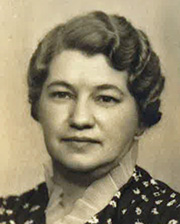
Minnie Lien
The Bible & My Grandma
-------------------------------------------------------------------------------------------------------------------------------------
Undercutting Biblical Scholarship
By Pastor Marshall
I was
very close to my material grandmother, Minnie Lien
(1893–1979). She lived in Montana for years where we
visited her regularly. After Grandpa died in 1966, she
moved into our neighborhood in Tacoma where I saw much
more of her. The first three years of college, I lived
with her in the summers. We picked wild blackberries and
cooked them together, and laughed a lot – mostly at our
expense. I remember trying to read my tribute to her at
her funeral and breaking down in tears. Over the years
she helped me learn Bible verses – “The Lord is my
shepherd, I shall not want.” “For God so loved the world
that he gave his only Son.” “Faith is a gift lest anyone
should boast.” “Fight the good fight of faith.” “Jesus
was obedient unto death, even death on a cross.” “Just
as Jesus was raised from the dead, so shall we be
raised.” “Keep the Sabbath day holy.” “Think more highly
of others than yourself.” “Deny yourself and follow
Jesus.” And many more.
When I went to Luther Seminary in Saint Paul,
Minnesota, in 1971, to study for the ordained ministry,
one of my first classes was on the historical critical
interpretation of the Bible. It was taught by a young
professor with a doctoral degree from Harvard. He was an
expert on Luke and Acts and the miracles of Jesus. This
critical approach to the Bible had been finely honed by
the German Lutheran preacher and scholar, Rudolf
Bultmann (1884–1976). He called this way of reading the
Bible, Sachkritik,
or “content criticism” [R. A. Harrisville,
Pandora’s Box
Opened (2014) p. 185]. By so doing he divided the
content of the Bible between what is lasting (kerygma)
and what needs updating (myth) – such as miracles,
demons, the sacraments, the sacrifice of Christ and his
resurrection and ascension. Without this
differentiation, we would end up believing the wrong
thing, living unrighteous lives, and missing out on
salvation [Kerygma
and Myth, ed. H. W. Bartsch (1961) pp. 1–44].
So in class I asked the professor if my Grandma Minnie
was headed for hell since she didn’t practice
Sachkritik.
He laughed and asked if she was baptized and believed in
Jesus. I said yes. Then he said she was okay. So I asked
back why I should take his class then since not knowing
about Sachkritik
wouldn’t affect my salvation, or, for that matter, any
of the people I would eventually work with as a pastor.
His straight-faced answer was: “Because it is required
for graduation from Luther Seminary.” I thought that was
a stupid answer. But the bell rang; class was dismissed;
nobody said anything about the exchange; and that was
the end of that.
But ten years later the same professor was lecturing on
Sachkritik at
a pastors’ conference in Bend, Oregon, and I was there.
I sat in the back and listened to his lecture on how we
needed this critical approach to the Bible to be good
preachers and pastors. At the end of the lecture, he
asked for questions. Most of the pastors looked like
they were ready to play golf, so no one asked anything.
At that point I asked about my Grandma again – by this
time she had died. And he gave the same answer – without
apparently recognizing me from my seminary days. So I
asked him why we should care about his lecture if it
didn’t matter. This time he couldn’t say because it was
required for graduation since we were all pastors and
had already graduated. I thought he might say it would
be a good refresher. But he instead said: “I don’t
know.” At that point silence fell,
no one said a
thing, everybody lightly, and unevenly,
applauded, and we all left to enjoy the out of
doors.
Years later, a world famous practitioner of
Sachkritik, Eta Linnemann (1926–2009) – see
her classic text in that genre,
The
Parables of Jesus (1966) – repented of her
wicked handling of the Holy Scriptures, and
wrote about it in her books
Historical Criticism of the Bible (1990),
Is There
a Synoptic Problem? (1992), and
Biblical
Criticism on Trial (2001). [Her last book,
Bibel
oder Bibelkritik? (2007), isn’t translated
yet.] Upon reading them I was elated and gave
thanks to God. But our seminaries didn’t, and to
this day still teach
Sachkritik. May we hope and pray that one
day they follow Professor Linnemann’s example.
|
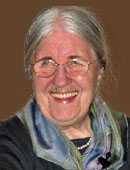
Eta Linnemann |
|

|
| |
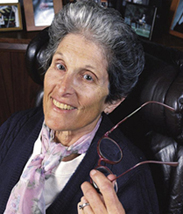
God’s Commanding Word
-------------------------------------------------------------------------------------------------------------------------------
Coercive & Imperious
By Pastor Marshall
Because of the young rich man walking away –
uncooperatively – after Jesus tells him what he has to
do to be saved (Mark 10:22), we think that God’s Word is
ineffectual. We think it only has power if we accept it.
We think it otherwise just rolls off us like water off a
duck’s back.
But that leaves too much out. It leaves out the
world coming into existence simply by God saying – let
there be light and there was evening and morning, one
day (Genesis 1:3–5). It leaves out the storm ceasing –
at Christ’s command – without any atmospheric
cooperation (Mark 4:39). It leaves out Paul being
suddenly converted – at the flash of lightning – without
any consultation (Acts 9:3–22). It leaves out God’s
commanding word that returns not empty (Isaiah 55:11).
This shocking word has been called “coercive” [Brevard
S. Childs, Isaiah
(2001) pp. 18, 21, 54, 58, 63, 68, 102, 263, 421, 422,
437], and “imperious” – being able to “suddenly and
radically change my whole life on a prodigious scale” [Kierkegaard’s
Writings (1851) 21:31].
The American poet, Maxine Kumin (1925–2014) –
winner of the Pulitzer Prize for Poetry in 1973 – longed
for such a commanding word in her 1996 poem, “The Word”
[Good Poems:
American Places, ed. Garrison Keillor (Penguin,
2011) p. 206]. She sees it operational in the forest
with the pups of a mother fox – “how they dive for a
burrow on command, how they re-emerge at another word
she uses, a word I am searching for.” Kumin ends her
poem describing the traits of such a commanding word:
Its
sound is o-shaped and unencumbered,
The
see-through color of river,
Airy
as the topmost evergreen fingers
And
soft as pine duff underfoot…
That’s not quite the fiery and smashing word in
Jeremiah 23:29, but it is the insinuating, implanted one
of James 1:21. Either way it’s still God’s commanding
word. So let us learn again how to “tremble” before it
(Isaiah 66:2)!
|
|
| |
|
2 Corinthians 2.15
Monthly Home Bible Study, April 2016, Number 278
The Reverend Ronald F. Marshall
Along with our other regular study of Scripture, let us
join as a congregation in this home study. We will
study alone
then talk informally about the assigned verses together
as we have opportunity. In this way we can "gather
together
around the Word" even though physically we will not be
getting together (Acts 13.44). (This study uses the RSV
translation.)
We need to support each other in this difficult project.
In 1851 Kierkegaard wrote that the Bible is "an
extremely dangerous book.... [because] it is an
imperious book... – it takes the whole man and may
suddenly and radically change... life on a prodigious
scale" (For
Self-Examination). And in 1967 Thomas Merton wrote
that "we all instinctively know that it is dangerous to
become involved in the Bible" (Opening
the Bible). Indeed this word "kills" us (Hosea 6.5)
because we are "a rebellious people" (Isaiah 30.9)! As
Lutherans, however, we are still to "abide in the womb
of the Word" (Luther's
Works 17.93) by constantly "ruminating on the Word"
(LW 30.219)
so that we may "become like the Word" (LW
29.155) by thinking "in the way Scripture does" (LW
25.261). Before you study, then, pray: "Blessed Lord,
who caused all holy Scriptures to be written for our
learning: Grant us so to hear them, read, mark, learn,
and inwardly digest them, that we may embrace and ever
hold fast the blessed hope of everlasting life, which
you have given us in Our Savior Jesus Christ. Amen"
(quoted in R. F. Marshall,
Making A New
World: How Lutherans Read the Bible, 2003, p. 12).
And don’t give up, for as Luther said, we “have in
Scripture enough to study for all eternity” (LW
75:422)!
Week I.
Read 2 Corinthians 2.15 noting the words
aroma and
perishing.
What is this aroma? On this read 2 Corinthians 2.15
noting the line
the aroma of Christ to God. How does this aroma go
to God or affect God? On
this read John 5.22–29 noting the words
Father,
Son,
judges,
judgment,
good and
evil. How
then does the negative judgment against those perishing
affect God? On this read Romans 2.5 noting the line
storing up wrath
for yourself. How does this storing up affect God?
On this read 2 Thessalonians 1.9 noting the line
eternal
destruction and exclusion from the presence of the Lord.
So when this deadly aroma ascends to God it incites his
wrath against those perishing. What comes of this? On
this read Luke 16.26 noting the line
a great chasm has
been fixed, in order that… none may cross. How
horrible is this permanent isolation from God? On this
read Luke 16.27–28 noting the word
torment. Read
also Revelation 9.5 noting the word
torture, and
Matthew 25.30 noting the words
outer darkness
and weep.
What’s the point of these verses? On this read 1
Corinthians 10.6 noting the whole line
these things are
warnings for us, not to desire evil as they did.
Read as well Luke 13.5 noting the line
unless you repent
you will all likewise perish. What do you think of
this? Does it matter?
Week II.
Read again 2 Corinthians 2.15 noting again the words
aroma and
perishing.
What does this smell like? On this read 2 Corinthians
2.16 noting the line
a fragrance from
death to death. The smell of death is universally
foul to us. What is the point in this comparison? On
this read Luke 12.20 noting the word
fool. Does
this word deal death to our self-esteem? Read also Mark
7.20–21 noting the words
heart and
defiles.
Does this testimony to our rotten, defiled hearts
also deal death to us? And read 2 Timothy 3.2–4 noting
the words abusive,
inhuman and
conceit. Do
these words also decimate the positive image we have of
ourselves? Are these three readings just what we need to
help us die with Christ according to 2 Corinthians
5.14–15? If
so, how so?
Week III.
Reread 2 Corinthians 2.15 noting this time the words
aroma and
saved. What
is this aroma like? On this read 2 Corinthians 2.16
noting the line a
fragrance from
life to life.
What is this aroma of life? On this read Galatians 2.20
noting the line
it is no longer I who live, but Christ who lives in me.
Read also John 10.10 noting the line
that we might
have life, and have it abundantly. And read as well
John 6.53 noting the correlation between the words
life,
flesh and
blood. So
does this aroma of life come from us? On this read 2
Corinthians 3.5 noting the line
not… to claim
anything as coming from us. What’s so fragrant about
this life, then? On this read John 5.26 noting the
phrase life in
himself. What does this sort of independence do when
it abides in us? On this read Galatians 1.10 noting the
words rejecting
pleasing men. Read as well John 5.44 noting the
words rejecting worldly
glory. And
read John 12.42–43 noting the words rejecting
the praise of men.
If all of this were to be followed, what would we be
like? On this read 1 Peter 2.11 noting the words
war,
exiles and
aliens. How
does that make you feel? What are you going to do about
it?
Week IV.
Read 2 Corinthians 2.15 one last time noting again the
word saved.
How shall we come to this salvation as just outlined? On
this read John 6.44 noting the words
come and
draw. Would
this drawing be a struggle for us? On this read Romans
11.24 noting the phrase
contrary to
nature. Would that make it easy or hard? On this
read Matthew 7.14 noting the word
hard. That
being the case, is it likely we’ll be saved? On this
read Luke 18.27 noting the word
impossible.
So is our goose cooked? On this read Matthew 11.28–29
noting the words
rest, gentle,
easy and
light. Does
that wipe out all difficulty? On this note still the
trembling in
Philippians 2.12–13, but also the line
God is at work in
you. So can you now explain how rest and trembling
go together? Does 2 Corinthians 6.10 help?
|
|
| |
|
Spring Sunday School Project
Lutheran World Relief
The Sunday
school students chose to support Lutheran World
Relief this Spring.
Their goal is to raise enough money to
purchase items to help sustain families and
communities.
They want to help those people living in
poverty around the world.
They hope to raise enough money to
purchase a metal rickshaw, fruit tree seedlings
and quilts for children.
All of this can be purchased for $208.
If they raise an extra $165 they will
then purchase farming tools and hens and chicks!
They are ambitious students.
We will plan another bake sale to help
raise funds too.
So look for the student’s LWR poster and
donation can!
Thank you for your support of the Sunday
school students and their hope to help those
living in profound poverty around the world.
All donations are welcome.... please write your
checks to FLCWS designated LWR
Gina Allen,
Church Council Education Chair
|
|
|
| |
|
The
Sacrament
of
Penance
On the third Saturday of each month, between 3 and 5 pm,
the Sacrament of Penance is offered in the Chapel.
This brief liturgy enables people – one at a time
– to confess their sin and receive the blessed assurance
of forgiveness.
This liturgy is ancient but largely neglected in
recent years in America.
It is similar to the Roman Catholic confessional,
but unlike it, in that this liturgy is done face to face
with the pastor.
Copies of the liturgy are available in the church
office.
This individual form of confession is more
forceful than the general form used during Advent and
Lent in the Communion liturgy.
It allows for, but does not require, listing of
specific sinful burdens.
It also provides for specific instructions from
the pastor for each penitent.
These additional details make for its greater
force in
our lives.
Martin Luther's critique of confession never
included the elimination of individual, private
confession.
His critique instead only corrected the way it was being
done.
So we continue to honor his words in his
Large Catechism:
“If you are a Christian, you should be glad to
run more than a hundred miles for confession.” (BC,
p. 460).
Plan to come – Saturday,
April 16th,
3 to 5 pm in the Chapel.

|
|
| |
|

Cynthia Natiello
Putting the Church in Your Will
By Pastor Marshall
Our
church endowment fund continues to grow.
We thank God for all who have made gifts to this
fund and the support it provides our church. Especially
we thank God for the major donors to our endowment fund
– George (1925-2003) & Marion (1929-2005) Colvin, Lila
Granaas (1913-2002), Orma Nesheim (1917-2010), and Alida
Rottman (1922-2011).
Our newest major donation – $25,655 – is in
memory of Cynthia Natiello (1958-2016).
Her funeral was here on February 27, 2016.
Her cremated remains are inurned in the
columbarium – our Chapel of the Resurrection.
We thank God for this gift from Cynthia and Cary,
and their family and friends.
Take
this occasion to consider
including the
church in your will.
If you would like to do this and have not done so
already, think of
giving 10% of the residual value of your estate to the
church.
In this way you will be able to tithe the income the
investments of your estate has earned over the years.
This is a fitting way to thank God for the
blessings of prosperity we all enjoy.
Our endowment fund was established in January
1996. The
gifts made to the fund are never spent.
Most of the interest earned is added each to year
to help meet our budget.
In this way you can go on supporting our church
long after you have departed to join the church
triumphant.
Glory be to God!
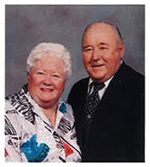
George & Marion Colvin |

Lila Granaas |
%20web%20size%20name%20removed.jpg)
Orma Nesheim |
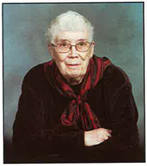
Alida Rottman |
|
|
| |
|
 PARISH PRAYERS
PARISH PRAYERS

Remember in
prayer before God those whom He has made
your
brothers and
sisters through baptism.
June Wittman, Hannah Weyer, Mariann Petersen, Jeannine
Lingle, Kaoru Schorn, Evelyn Coy, Mary Goplerud, Chuck
Prescott, Peggy & Bill Wright, David, Eileen and Michael
Nestoss, Melanie Johnson, Ion Ceaicovschi, Bob & Barbara
Schorn, Luke Bowen, Tabitha Anderson, The PLU Faculty,
Robert Crowmartie, Celia Balderston, Mike Harty, Asha
Sagmoen, Dean Cheney, Kevin James, Ken Sharp, Bruce &
Margaret Kirmmse, Margaret Douglass, Mike Granger,
Denise Alvord, Jim Thoren, Dee Grenier, Betty Hieber,
Justin Schumacker, Kineta Langford, Ellen Marie
Schroeder, Shirley Eaton, Jan Markquart, Clark Johnson,
Marie Collins, our presidential election year, and those
effected by the Zika virus, the great migration from the
Near East into Europe and other parts of the world.
Also pray for those affected by the violent
attacks in Brussels, Belgium, and Lahore, Pakistan.
Pray for the shut-ins that the light of Christ may give
them joy:
C. J. Christian, Louis Koser, Anelma Meeks, Dorothy
Ryder, Lillian Schneider, Crystal Tudor, Nora Vanhala,
Elmer & June Wittman, Peggy & Bill Wright.
Pray for our bishops Elizabeth Eaton and Brian
Kirby Unti, our pastor Ronald Marshall, our deacon Dean
Hard and our cantor Andrew King, that they may be
strengthened in faith, love and the holy office to which
they have been called.
Pray that God would give us hearts which find joy
in service and in celebration of Stewardship.
Pray that God would work within you to become a
good steward of your time, your talents and finances.
Pray to strengthen the Stewardship of our
congregation in these same ways.
Pray for the hungry, ignored, abused, and
homeless this April.
Pray for the mercy of God for these people, and
for all in Christ's church to see and help those who are
in distress.
Pray for our sister congregation: El Camino de
Emmaus in the Skagit Valley that God may bless and
strengthen their ministry. Also, pray for our parish and
it's ministry.
Pray that God will bless you through the lives of
the saints: Albrecht Dürer painter, 1528; Dietrich
Bonhoeffer, teacher, 1945; Saint Mark, Evangelist;
Catherine of Siena, teacher, 1380.
|
|
A
Treasury of Prayers
Dear
Heavenly Father, just as you sought out the woman at the
well when she wasn’t looking for you, deal with me
according to that same free mercy which you showed to
her. Through your word, speak to me; bring my sins to
mind; and make me thirst for the salvation you are ready
to give. In Jesus’ name I pray. Amen.
[For
All the Saints (ALPB, 1994-1996) 4 vols.,
IV:452, altered]
|
|
| |
|

